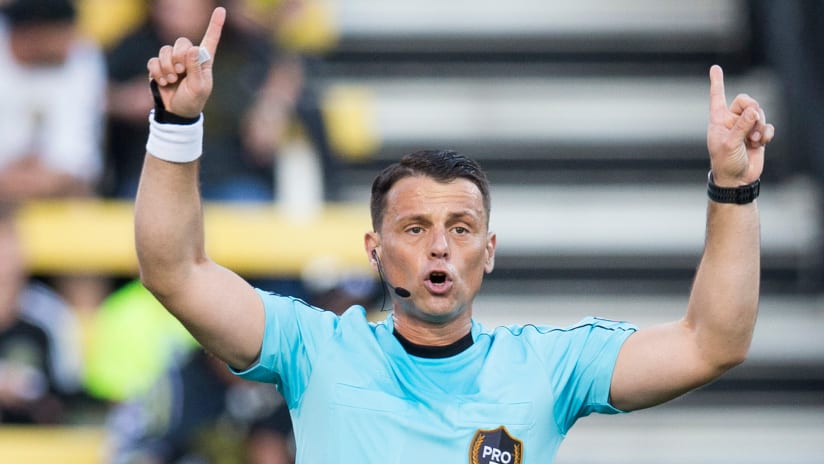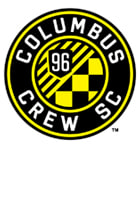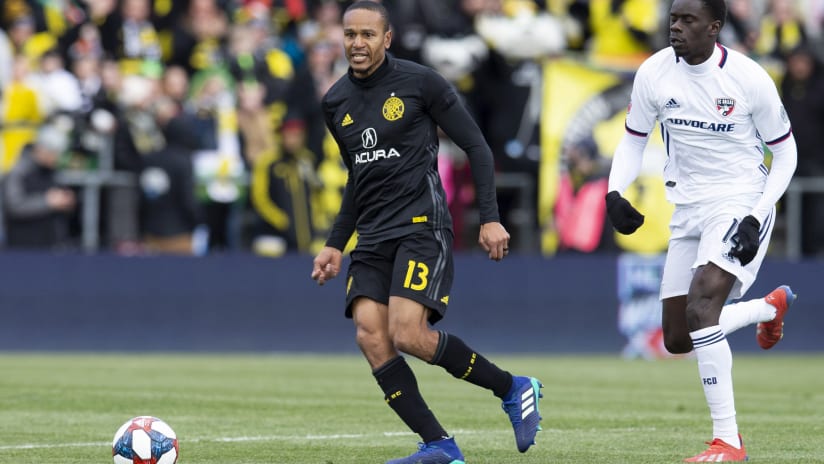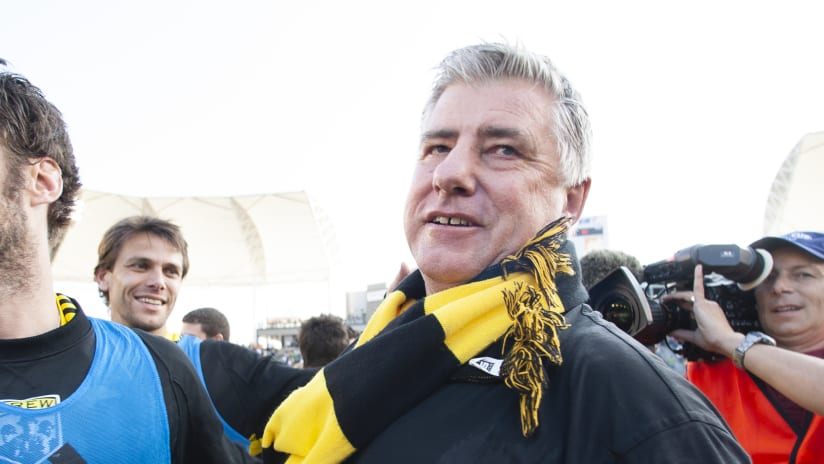Originally published on MLSsoccer.com by Sam Stejskal
Three months after it was first used in official competition, Howard Webb is pleased with how Video Review is being implemented in Major League Soccer.
The renowned former English Premier League, UEFA and FIFA referee and current Professional Referee Organization Manager of Video Assistant Referee Operations told MLSsoccer.com in an interview last week that, although the system is still in its infancy, he feels Video Review has been almost entirely positive for MLS.
“We did expect there to be some bumps and some things that prove difficult, and I think if you look at everybody around the world there’s been some examples of that, but I must say, looking at the big picture, we’re pretty pleased with how the implementation has gone,” said Webb.
Breaking down the numbers
The league became one of the first in the world to adopt Video Review in official competition when it introduced the system into live matches on Aug. 5.
Designed by the International Football Association Board, the decision-making body for the Laws of the Game, the Video Review system adds a Video Assistant Referee to each refereeing crew. The VAR constantly checks all plays using every available broadcast angle and alerts the head referee to potential clear and obvious errors on plays involving goals, penalty kicks, straight red cards and cases of mistaken identity.
Prior to taking the system live, PRO engaged in three years of video review testing, rolling out the system in live USL matches and offline tests over 100 times before it was introduced in MLS.
The video review system has been used 46 times in 149 MLS regular season and Audi 2017 MLS Cup Playoff matches so far, good for about one review every three games. Webb said that rate is on par with other leagues currently experimenting with Video Review, and that it’s a strong indicator that the system isn’t overly disruptive in individual matches.
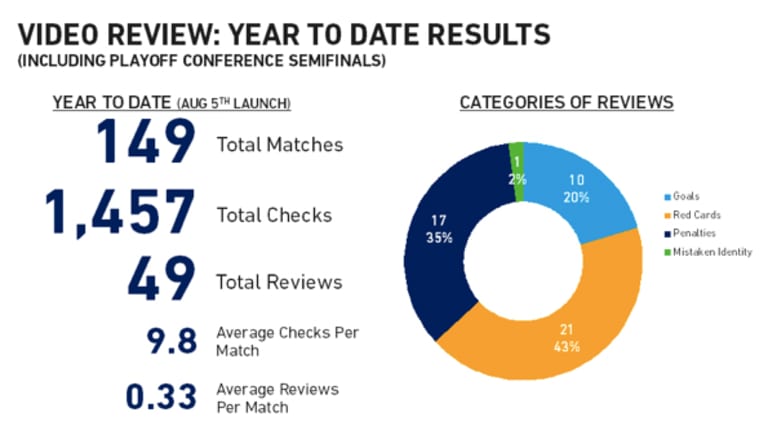
“Some people feared we would have stoppages all the time, lots of interventions, lots of interruptions to the flow of the game, and that’s one of the big successes of Video Review overall is that it’s only one [review] every three games,” Webb said. “I think that really is a success story. I think it tells you that we are limiting the interventions to the most important decisions and only when it’s clearly and obviously wrong call, and we’re able to correct those calls. I think that’s been one of the biggest successes, the fact that we haven’t changed the game, we haven’t changed the way the game is played.”
During the regular season, a total of 33 clearly wrong calls were changed to the correct final decision via Video Review. And goal scoring opportunities also weren't negatively impacted: Video Review led to 11 goal-scoring chances (including penalty kicks), while cancelling out 11 others. Also, of the 20 reviews for red card offenses during the regular season, 13 led to a red card being shown.
And while some detractors initially feared Video Review would undermine referees, Webb said its implementation has actually been a boost for MLS officials. With a VAR in their ear, head referees no longer question whether they got a decision right. With Video Review in place, they know they have some cover on the biggest, game-changing calls.
“Even when I was an active official in the English Premier League, with UEFA and FIFA, I had issues dealing with parking perceived mistakes, putting them to the back of your mind, keeping them there and not trying to not let it affect your performance,” Webb said.
“What Video Review’s done is it actually allows officials to do all of those things in a much more effective way, because they know they’ve got a trained, neutral, independent colleague who’s watching their decision-making with all the benefits of every angle and they’re able to correct you when you’ve made one of those big errors or when you’ve missed something important… Knowing that that’s been checked and when the VAR says the words ‘check complete’ to the referee which means they’ve looked at it, you’ve not made a clear error, move on, it gives you a real sense of confidence.”
Room for improvement
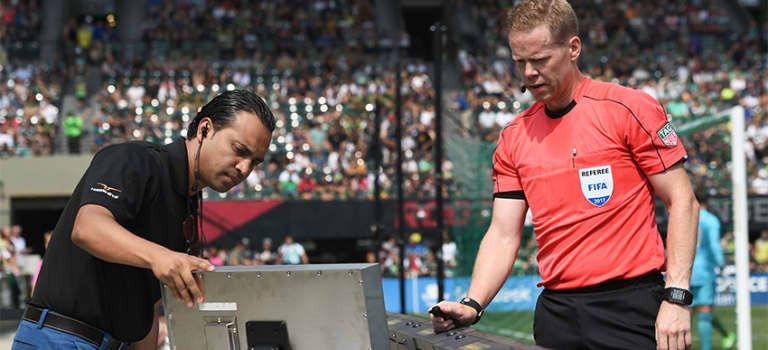
While Webb sees Video Review as an overwhelming positive for both MLS and referees, there are some finer points that the group will be working to iron out. He pointed to the need to “maintain consistency in what is a clear and obvious error” that triggers a review and said there have been a couple of times where MLS “officials have not placed that threshold in quite the right place.”
He also discussed the controversial offside decision that disallowed a Columbus Crew SC goal in their Knockout Round match at Atlanta last month (watch below). Crew SC’s Ola Kamara appeared to score a goal that would’ve put the visitors in front at Mercedes-Benz Stadium, but Pedro Santoswas flagged offside just before playing a square ball to a wide-open Kamara in the box. Replays indicated that Santos was not offside.
Referee Allen Chapman whistled for offside shortly after the assistant referee raised the flag, blowing the play dead before Kamara tapped in from close range. Since a goal was not in question at that point, the VAR was unable to initiate Video Review. Had Chapman held his whistle until after the ball hit the back of the net, Video Review could’ve been used on the play. Crew SC went on to win the game in a shootout.
Webb, who was in attendance in Atlanta, said that officials are encouraged to delay their whistle on such plays.
“On that occasion the referee didn’t open that window because he blew too quickly and therefore, although the VAR did exactly the right thing, the VAR’s hands were tied because quite clearly the whistle’s gone, the game is dead and the VAR couldn’t intervene,” Webb said. “So it wasn’t a failing of VAR, it was simply a referee who’s refereed hundreds of games a certain way and upon seeing a flag, has been encouraged for years and years to blow quickly to prevent anything else from happening. It’s just being pretty much ingrained in that philosophy and not taking the chance because it’s a pretty new system, not taking the chance to delay the whistle.”
Looking ahead, Webb said that PRO will continue to emphasize Video Review during debriefings with referees throughout the playoffs and at their preseason training camps ahead of the 2018 MLS regular season. They’ll also account for any potential changes to IFAB’s Video Review protocol as the governing body tweaks the system ahead of a potential worldwide rollout in future years.
“Until you go live you never know quite how it’s going to work and it’s something that none of us have been through, but overall we’re pleased with the way it’s been implemented,” he said.

